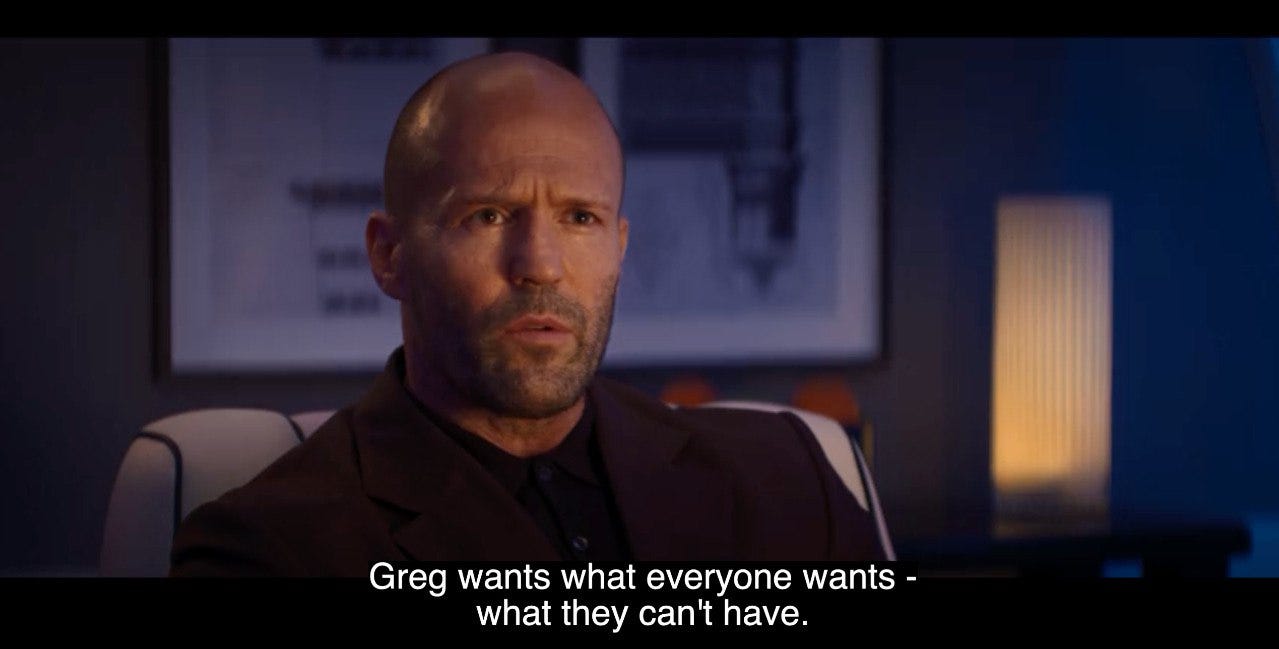Although the new Guy Ritchie movie, Operation Fortune, is a total stinker, one line did resonate. It’s when Orson Fortune (Jason Statham) describes the motivation of a billionaire arms dealer: “[He] wants what everyone wants — what they can’t have.”
To be an object of desire that object must be rare. Anything which exists in abundance swiftly loses all perceived value.
This week, OpenAI released GPT-4, the latest version of their AI chatbot that threatens to do to information workers what the steam engine did to artisans. It can write code, give medical advice, create marketing strategies, litigate, and much more.


AI offers an inhuman level of abundance. Type in a one-line prompt and it can produce screeds of text. There’s been so much abundance that I automatically scroll past anything that looks like an AI creation. I am bored by the thought of it.

Roland Barthes’ idea of the ‘death of the author’ presupposes that we don’t need to know anything about the author’s personality in order to enjoy their work. In a post-AI future, the vulnerabilities and flawed life of a writer are all we have to make their work meaningful in the face of excess robot-production.
A part of me fears a future that doesn’t need the skills that I have laboriously accumulated. Do I need to learn to plumb? Another part of me is optimistic about the opportunities for working with human beings to create things that are more meaningful. We hosted Sarah Drummond at UX Glasgow a couple of weeks ago and she made a strong case that AI can allow us to get on with making valuable work rather than spending so much time doing donkeywork.

Art and writing will have to become weirder, more socially engaged, and impossible for a computer to imitate. Ellie Harrison puts on events that are so strange it’s hard to imagine an AI copying the ‘code’ and putting on their own musical about bus privatisation. And, today, Emily Furneaux has organised her first Retail Parkrun, a satirical critique of shopping culture and parkrun. It is a human-sized project that would make no sense to a computer.
Most ideas are not so peculiar. The high-end creator, the genius, will retain value amidst such abundance, but everyone in the middle is going to suffer.
Two specters are haunting Earth in the twenty-first century: the specters of ecological catastrophe and automation.
A few years ago, Pete Frase wrote a book called Four Futures, which sketched out what might happen to a world dominated by questions of scarcity and abundance, hierarchy and equality.


It’s not difficult to imagine a future with people living in pods, connected to the metaverse, eating bugs, and enjoying digital ‘abundance’. This is the WALL·E future, where humans have left a ruined Earth to live lives of leisure in fully-automated spaceships. The automated future doesn’t equal more self-actualisation just more alienation.
Some, myself included, hold out hope that abundance will allow people to live joyfully and without fear, but it looks like we’ll just find new forms of artificial scarcity. Innovations like Bitcoin and NFTs are based on the hope that we can make digital things scarce, though it remains to be seen whether they will endure.
Digital abundance has created a world of distractions, where boredom cannot be tolerated. It seems optimistic to think the vision of AI will rouse the masses to become anti-technology, but you never know.

When self-help gurus talk about an abundance mindset they are talking about an abundance of love rather than, say, plastic trinkets. They speak of infinite love for your fellow beings, a kind of abstracted love that amounts to very little. There are eight billion people on the planet. Perhaps you’ll get to know one person really well in your life, maybe a dozen or so well enough to call close friends, but beyond that, it’s gossip and mystery. It’s far better to have concentrated love for a few than dissipated love for the many. This finitude, this scarcity, is what makes the connection valuable.
Let me know what you think in the comments.






Plenty to think about here & i'm still thinking! Apart from the Industrial Revolution being a precursor of AI, don't you think that cinema & television also were?
Iain M Banks had a lot to say on this in his Culture novels. sad he is no longer around to tell us more.